Duff Surname Ancestry ResultsOur indexes 1000-1999 include entries for the spelling 'duff'. In the period you have requested, we have the following 690 records (displaying 1 to 10): Single Surname Subscription | | | Buying all 690 results of this search individually would cost £3,796.00. But you can have free access to all 690 records for a year, to view, to save and print, for £100. Save £3,696.00. More... |
These sample scans are from the original record. You will get scans of the full pages or articles where the surname you searched for has been found. Your web browser may prevent the sample windows from opening; in this case please change your browser settings to allow pop-up windows from this site. Acolytes Ordained by the Bishop of Clonmacnoise (1412)
Recorded in the register of archbishop Nicholas Fleming of Armagh, calendared by the Reverend H. J. Lawlor
DUFF. Cost: £8.00.  | Sample scan, click to enlarge
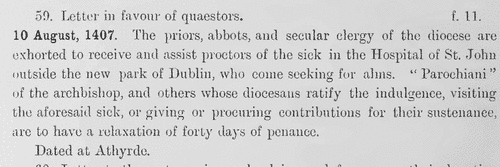
| Deacons Ordained by the Bishop of Clonmacnoise (1413)
Recorded in the register of archbishop Nicholas Fleming of Armagh, calendared by the Reverend H. J. Lawlor
DUFF. Cost: £8.00.  | Sample scan, click to enlarge
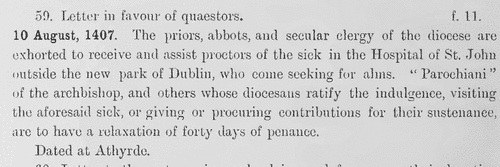
| Subdeacons Ordained by the Bishop of Clonmacnoise (1413)
Recorded in the register of archbishop Nicholas Fleming of Armagh, calendared by the Reverend H. J. Lawlor
DUFF. Cost: £8.00.  | Sample scan, click to enlarge
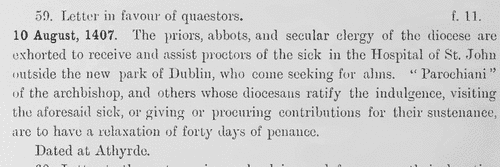
| Dublin diocese testators and legatees
(1457-1483)
This register of testaments or wills and inventories from the diocese of Dublin in the time of archbishops Tregury and Walton (now in the Library of Trinity College, Dublin) was printed with a translation by the Royal Society of Antiquaries of Ireland in 1896-7. The inventory usually comes first, and often includes names of debtors and creditors to the testator. The diocese of Dublin did not extend far into the Pale; but the province of Dublin, over which the archbishops had prerogative probate jurisdiction, included the southern half of Ireland, but virtually all these wills are from the city of Dublin or close at hand.DUFF. Cost: £4.00.  | Sample scan, click to enlarge
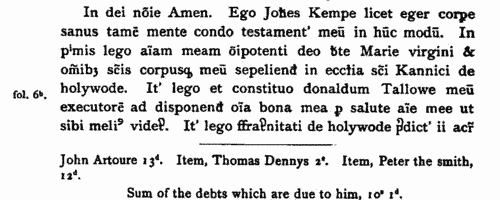
| Clergy and benefactors of the bishopric of Moray
(1250-1540)
The mediaeval diocese of Moray comprised the shire of Elgin and Forres (or Moray), Nairnshire, and a large part of the shires of Inverness and Banff, in the sheriffdom of Elgin and Forres (Moray). The cathedral was attacked and burned by the Wolf of Badenoch (Alexander earl of Buchan and lord of Badenoch): but about 1400 an attempt was made to piece together surviving archives into a bishop's register. The Liber Episcopi contains the canons and constitution of the church, and charters relating to episcopal privileges and properties; the Liber Decani is the dean and chapter register. A fair copy of these records, plus later charters and writs, was made in 1540 and is called the Red Book of the Church of Moray. These manuscripts, together with other material to as late as 1623, were collated for the Bannatyne Club and printed in 1837. DUFF. Cost: £4.00.  | Sample scan, click to enlarge
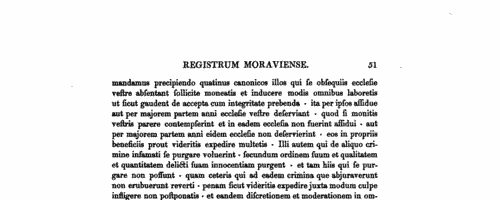
| Liegemen and Traitors, Pirates and Spies
(1550-1552)
The Privy Council of Edward VI was responsible for internal security in England and Wales, and dealt with all manner of special and urgent matters
DUFF. Cost: £4.00.  | Sample scan, click to enlarge

| Ambassadors, ministers, soldiers and spies
(1547-1553)
The State Papers Foreign of king Edward VI consist mainly of letters and reports concerning England's relations with continental Europe, particularly the Netherlands and France. This calendar was edited by William B. Turnbull and published under the direction of the Master of the Rolls in 1861. The main text (to page 290) is abstracts of 710 letters from official correspondents abroad; but the remainder of the volume, entitled Calais Papers, deals with the English enclaves on the French coast.DUFF. Cost: £4.00.  | Sample scan, click to enlarge
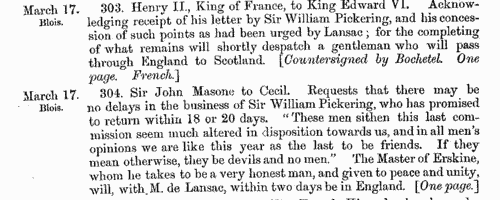
| Scottish litigants, rebels and cautioners
(1545-1569)
The Privy Council of Scotland exercised a superior judicial authority in the kingdom, and consequently received and dealt with a constant stream of petitions, as well as dealing with the internal security of the state. This register of the council from June 1545 to July 1569, in the reigns of Mary queen of Scots and king James VI, was edited by John Hill Burton, Historiographer Royal for Scotland, and published under the direction of the Lord Clerk Register of Scotland in 1877. Some of the individuals mentioned are the complainants, those of whom they complained, and the sureties on both sides: at this period, some of the complainants are alleging serious attacks, often of a feuding nature. Many of the bonds entered into by the cautioners are promises to keep the peace towards such enemies. Failure to answer to the council when summoned was a serious contempt, leading to being denounced a rebel, with serious consequences. But 'horning' was also used in the pursuit of debts: there was no imprisonment for debt in Scotland, but a creditor could have an obstinate debtor ordered, in the sovereign's name, to pay what was due, failing which, the debtor could be put to the horn, denounced as a rebel, and imprisoned as a rebel. In his preface to this volume, Burton remarked that "There might perhaps be objections to the abundance of names of persons and places unknown to fame; but it was considered that in such a work the proper names of all persons and places occurring in the Register should be preserved, to be at the service of genealogical as well as historical investigators".
DUFF. Cost: £4.00.  | Sample scan, click to enlarge

| Scottish litigants, rebels and cautioners
(1569-1578)
The Privy Council of Scotland exercised a superior judicial authority in the kingdom, and consequently received and dealt with a constant stream of petitions, as well as dealing with the internal security of the state. This register of the council from July 1569 to June 1578, in the reign of king James VI, was edited by John Hill Burton, Historiographer Royal for Scotland, and published under the direction of the Lord Clerk Register of Scotland in 1878. Some of the individuals mentioned are the complainants, those of whom they complained, and the sureties on both sides: at this period, some of the complainants are alleging serious attacks, often of a feuding nature. Many of the bonds entered into by the cautioners are promises to keep the peace towards such enemies. Failure to answer to the council when summoned was a serious contempt, leading to being denounced a rebel, with serious consequences. But 'horning' was also used in the pursuit of debts: there was no imprisonment for debt in Scotland, but a creditor could have an obstinate debtor ordered, in the sovereign's name, to pay what was due, failing which, the debtor could be put to the horn, denounced as a rebel, and imprisoned as a rebel.
DUFF. Cost: £4.00.  | Sample scan, click to enlarge

| Scottish litigants, rebels and cautioners: excluded names
(1569-1578)
The Privy Council of Scotland exercised a superior judicial authority in the kingdom, and consequently received and dealt with a constant stream of petitions, as well as dealing with the internal security of the state. This register of the council from July 1569 to June 1578, in the reign of king James VI, was edited by John Hill Burton, Historiographer Royal for Scotland, and published under the direction of the Lord Clerk Register of Scotland in 1878. Some of the individuals mentioned are the complainants, those of whom they complained, and the sureties on both sides: at this period, some of the complainants are alleging serious attacks, often of a feuding nature. Many of the bonds entered into by the cautioners are promises to keep the peace towards such enemies. Failure to answer to the council when summoned was a serious contempt, leading to being denounced a rebel, with serious consequences. But 'horning' was also used in the pursuit of debts: there was no imprisonment for debt in Scotland, but a creditor could have an obstinate debtor ordered, in the sovereign's name, to pay what was due, failing which, the debtor could be put to the horn, denounced as a rebel, and imprisoned as a rebel. In his preface to the first volume, Burton remarked that "There might perhaps be objections to the abundance of names of persons and places unknown to fame; but it was considered that in such a work the proper names of all persons and places occurring in the Register should be preserved, to be at the service of genealogical as well as historical investigators". But by this, second, volume, he decided that complete coverage was impractical, with "the crowding in of proper names, all but a few being the names of obscure persons ... Borderers are called up in considerable groups, and ordered to find, or recorded as having found, sureties for giving compensation to persons plundered, or for good conduct for the future. Several burgesses are sometimes entered in a minute about a Corporation quarrel. When the particulars of unimportant private litigations are omitted, the names remain." He therefore devised this 'Index of Names excluded from the Text', giving name, conditions, and date in register.
DUFF. Cost: £4.00.  | Sample scan, click to enlarge

|
Research your ancestry, family history, genealogy and one-name study by direct access to original records and archives indexed by surname.
|












